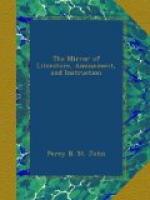fancies, or despairing fears and gloomy forebodings.
In one of her letters from this seminary, she writes
thus to her mother: “I hope you will feel
no uneasiness as to my health or happiness; for, save
the thoughts of my dear mother and her lonely life,
and the idea that my dear father is slaving himself,
and wearing out his very life, to earn a subsistence
for his family—save these thoughts (and
I can assure you, mother, they come not seldom), I
am happy. Oh! how often I think, if I could have
but one-half the means I now expend, and be at liberty
to divide that with mamma, how happy I should be!—cheer
up and keep good courage.” In another,
she says: “Oh! I am so happy, so contented
now, that every unusual movement startles me.
I am constantly afraid that something will happen
to mar it.” Again, she says: “I
hope the expectations of my friends will not be disappointed:
but I am afraid you all calculate upon
too much.
I hope not, for I am not capable of much. I can
study and be industrious; but I fear I shall not equal
the hopes which you say are raised.” The
story of Kirke White should operate not more as an
example than a warning; but the example is followed
and the warning overlooked. Stimulants are administered
to minds which are already in a state of feverish
excitement. Hotbeds and glasses are used for
plants which can only acquire strength in the shade;
and they are drenched with instruction, which ought
“to drop as the rain, and distil as the dew—as
the small rain upon the tender herb, and as the shower
upon the grass.”
During the vacation, in which she returned home, she
had a serious illness, which left her feeble and more
sensitive than ever. On her recovery she was
placed at the school of Miss Gilbert, in Albany; and
there, in a short time, a more alarming illness brought
her to the very borders of the grave. Before
she entered upon her intemperate course of application
at Troy, her verses show that she felt a want of joyous
and healthy feeling—a sense of decay.
Thus she wrote to a friend, who had not seen her since
her childhood:—
And thou hast mark’d in childhood’s
hour
The fearless boundings of
my breast,
When fresh as summer’s opening flower,
I freely frolick’d and
was blest.
Oh say, was not this eye more bright?
Were not these lips more wont
to smile?
Methinks that then my heart was light,
And I a fearless, joyous child
And thou didst mark me gay and wild,
My careless, reckless laugh
of mirth:
The simple pleasures of a child,
The holiday of man on earth.
Then thou hast seen me in that hour,
When every nerve of life was
new,
When pleasures fann’d youth’s
infant flower,
And Hope her witcheries round
it threw.
That hour is fading; it has fled;
And I am left in darkness
now,
A wanderer tow’rds a lowly bed,
The grave, that home of all
below.




